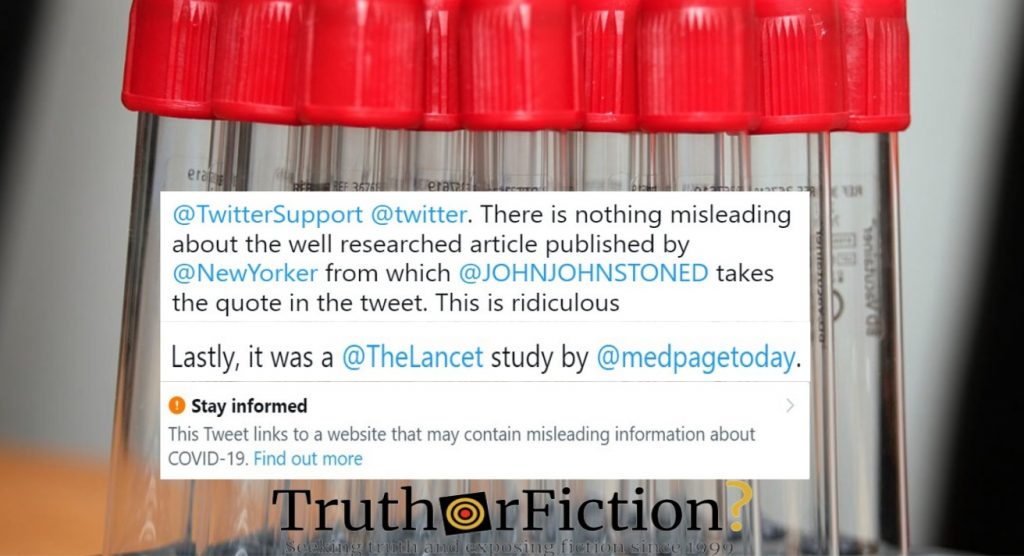Social platform Twitter flagged articles about COVID-19 as “potentially misleading,” despite the articles being based on actual research and legitimate reporting, with no explanation, before later admitting to several “mistakes.”
One such article, posted by the International Committee of the Fourth International (ICFI) on August 19 2022, summarizes two papers published in the journal Science on July 26 2022, both of which further debunk the conspiracy theory blaming the COVID-19 pandemic on a laboratory in the Chinese province of Wuhan.
Fact Check
Claim: Twitter Wrongfully Flags Stories on COVID-19 Research as Misleading
Description: Twitter has been incorrectly flagging legitimate articles based on actual research and reporting about COVID-19 as ‘potentially misleading’, a claim which revolves around the social platform affecting the propagation of valid information on scientific research.
According to the article:
The first paper, by Michael Worobey from the Department of Ecology and Evolutionary Biology at the University of Arizona and his team—”The Huanan Seafood Wholesale Market in Wuhan was the early epicenter of the COVID-19 pandemic”—maps the earliest period of the outbreak and determines that wild animals caged at the market were the most likely source of the virus.
The second paper by Jonathan E. Pekar, from the Bioinformatics and Systems Program at the University of California San Diego, et al.—”The molecular epidemiology of multiple zoonotic origins of SARS-CoV-2″—determines that two variants were present at the earliest stages of the outbreak dubbed strains A and B and that they were the result of two separate spillover events from animals to humans.
The article also notes that the conspiracy theory claiming the virus was “manufactured” was used as fodder for anti-Asian racist behavior.
On August 22 2022, ICFI reported that its tweet promoting the article was accompanied by a notice to users saying, “Stay Informed. This Tweet links to a website that may contain misleading information about COVID-19.”
On the morning that this article was published, Twitter sent an email to WSWS writer Evan Blake stating, “Our support team has reviewed your account and it appears we made an error. We’ve determined that the Tweet is not in violation of our Covid-19 Misleading Information Policy. We sincerely apologize for any inconvenience and hope to see you back on Twitter soon.”
However, the article continues to be flagged by the platform:
Twitter did not respond to a request for comment on the flag on the ICFI’s article. But it is not the only piece of sound reporting flagged by the platform; one reader shared a screenshot of their account being suspended for violating Twitter’s policy on “misinformation” after they linked to an article from the news site Medpage Today reporting on a study published in medical journal The Lancet.
According to this story:
Up to 2 years after infection, people who had COVID-19 continued to face increased risks of neurologic and psychiatric sequelae compared with people who had other respiratory infections, a retrospective study showed.
Health records of nearly 1.3 million people — mostly in the U.S. — showed that risks of cognitive deficit (brain fog), dementia, psychotic disorders, and epilepsy or seizures were increased at 2 years for adults who had COVID, reported Paul Harrison, FRCPsych, of the University of Oxford in England, and colleagues.
“We plan to look into this to see how/why it happened, to the best of our ability,” Medpage Today senior vice president of editorial Rachel Warren told us.
Another account also shared a screenshot of the platform flagging yet another separate article, this one published in the New Yorker on August 12 2022:
This story focused on the mounting evidence suggesting a link between COVID-19 and preeclampsia, a complication that can cause blood pressure to rise for pregnant people.
The magazine reported:
A study of more than three hundred thousand women in England, conducted in 2020 and 2021, showed that patients who were infected with covid when they gave birth had higher rates of preeclampsia, emergency C-sections, preterm birth, and stillbirths. Similar findings were reported in a National Institutes of Health study of pregnant people in the U.S. who experienced severe covid symptoms and also by the intercovid study, which involved more than two thousand pregnant women in eighteen countries, and which showed a strong correlation between covid infection and preeclampsia and preterm birth, especially for first-time mothers.
Twitter did not respond to our requests for comment on the matter, but later told the Washington Post that the labels had been removed from the tweets in question, while some accounts received apologies for what the platform claimed was a mistake.
“We acknowledge the mistakes made in these cases, and we are reviewing our team’s protocol to safeguard against such mistakes in the future,” spokesperson Celeste Carswell told the newspaper. “We appreciate the community’s feedback and remain focused on reducing harm and providing informative context across Twitter.”
Update 8/25/2022, 11:52 a.m. PST: Updated to reflect the removal of notices against tweets highlighting COVID-19 research. — ag
- Two Recent Papers Further Confirm Natural Origin of SARS-CoV-2 Virus
- The Huanan Seafood Wholesale Market in Wuhan was the Early Epicenter of the COVID-19 Pandemic
- The Molecular Epidemiology of Multiple Zoonotic Origins of SARS-CoV-2
- Post-COVID Neurologic, Psychiatric Symptoms May Persist for 2 Years
- Why a Life-Threatening Pregnancy Complication Is on the Rise
- Twitter Labeled Factual Information About COVID-19 as Misinformation

